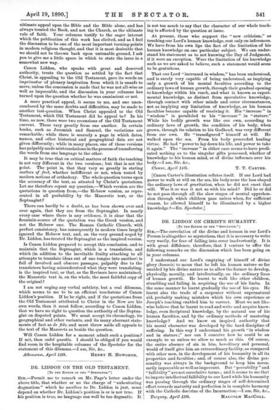DR. LIDDON ON THE OLD TESTAMENT.
[To THE EDITOR OF THE " SPECTATOR."1
'SIR,—Permit me to remark on Mr. Page's letter under the above title, that whether or no the charge of "unhesitating dogmatism" which he ascribes to Dr. Liddon is just, must depend on whether Dr. Liddon's position is or is not true. If his position is true, no language can well be too dogmatic. It
is not too much to say that the character of our whole teach- ing is affected by the question at issue.
At present, those who support the "new criticism," as touching our Lord's human knowledge, rest only on inferences. We have from his own lips the fact of the limitation of his human knowledge on one particular subject. We can under- stand his statement as to not knowing the Day of Judgment, if it were an exception. Were the limitation of his knowledge such as we are asked to believe, such a statement would seem to be gratuitous.
That our Lord "increased in wisdom," has been understood, and is surely very capable of being understood, as implying only a growth of his mental faculties according to the ordinary laws of human growth, through their gradual opening to knowledge within his reach, and what is known as experi- mental knowledge, as distinct from speculative knowledge, through contact with other minds and outer circumstances, not as implying any limitation of knowledge, as his human faculties became capable of receiving it. His "increase" in " wisdom " is paralleled to his " increase " in "stature." While his bodily growth was like our own, according to ordinary laws of growth, the condition of his body, when grown, through its relation to his Godhead, was very different from our own. He " transfigured " himself at will. He walked upon the sea. From his body proceeded healing virtue. He had "power to lay down his life, and power to take it again." The " increase " in either case seems to have predi- cated nothing as to the singular gifts possessed, whether of knowledge to his human mind, or of divine influence over his body.—I am, Sir, &c., [Canon Carter's illustration refutes itself. If our Lord had power to walk at will on the sea, his body none the less obeyed the ordinary laws of gravitation, when he did not exert that will. Was it or was it not so with his mind? Did he or did he not pass through all the slow stages of mental apprehen- sion through which children pass unless when, for sufficient reason, he allowed himself to be illuminated by a higher knowledge F—En. Spectator.]


















































 Previous page
Previous page